
Science fiction and technology writer
Popular blog posts
Recent forum posts
Discussion Forum
Discussion forumThe return of Wing Commander?
Post #: 133
Post type: Blog post
Date: 2012-10-17 13:40:40.000
Author: Jeremy Reimer
Tags: Gaming
I just saw this:
https://www.youtube.com/watch?v=RlIWJlz6-Eg&feature=youtube_gdata_player
and I was like this:
Views: 7830
So what did I do this summer?
Post #: 131
Post type: Blog post
Date: 2012-09-20 10:34:48.000
Author: Jeremy Reimer
Tags: Star Trek
Oh, not much.
Just commanded the Starship Enterprise.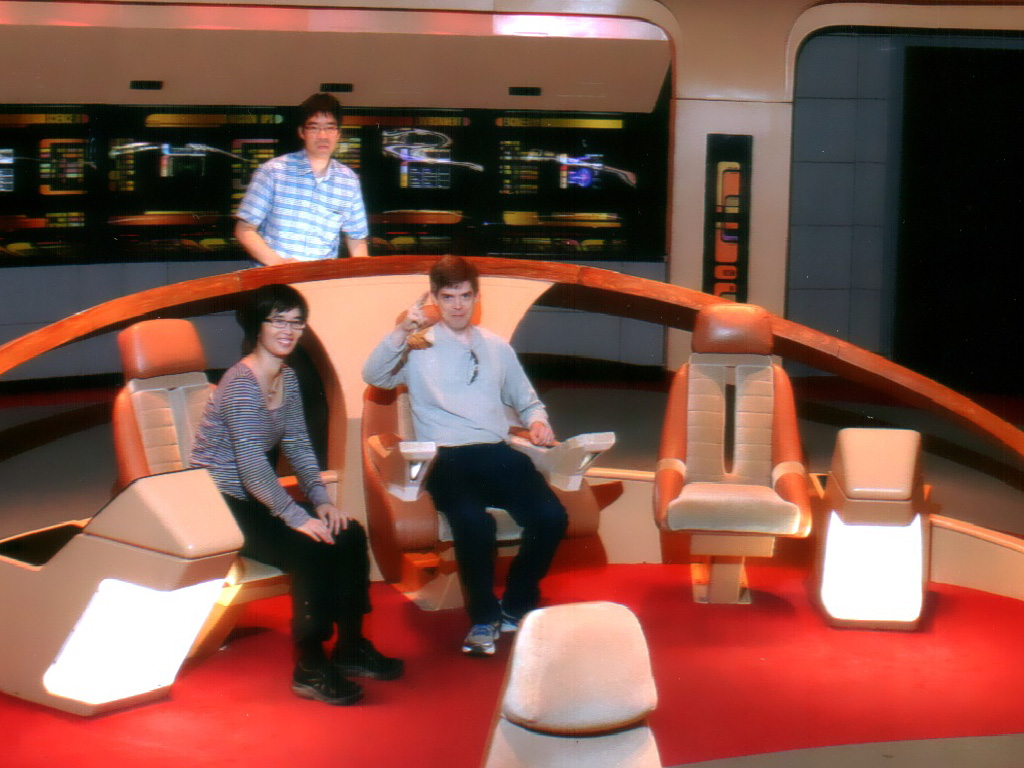
This was taken at the PNE. My wife is handling Riker’s duties (she didn’t want to be Counsellor Troi-- who does?) and my brother-in-law is ably manning the science station. Or maybe it’s the weapons station. Or the security station. Well, it’s whatever the script needs it to be, okay?
This was part of the awesome Star Trek exhibit. It’s a full-size replica of the original bridge set, which was destroyed in the disappointing Generations movie. I also got to sit in Kirk’s original chair, which was pretty awesome.
EDIT: Okay here’s a pic of me in Kirk’s chair.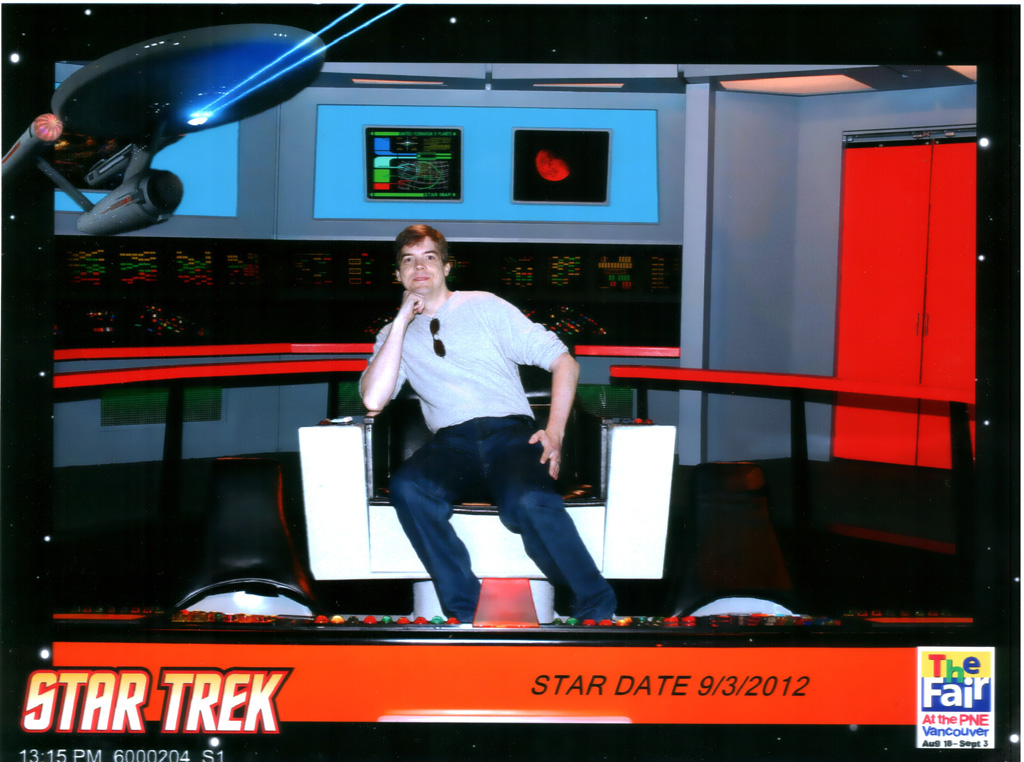
EDIT AGAIN: And here's the NCC-1701D's transporter room: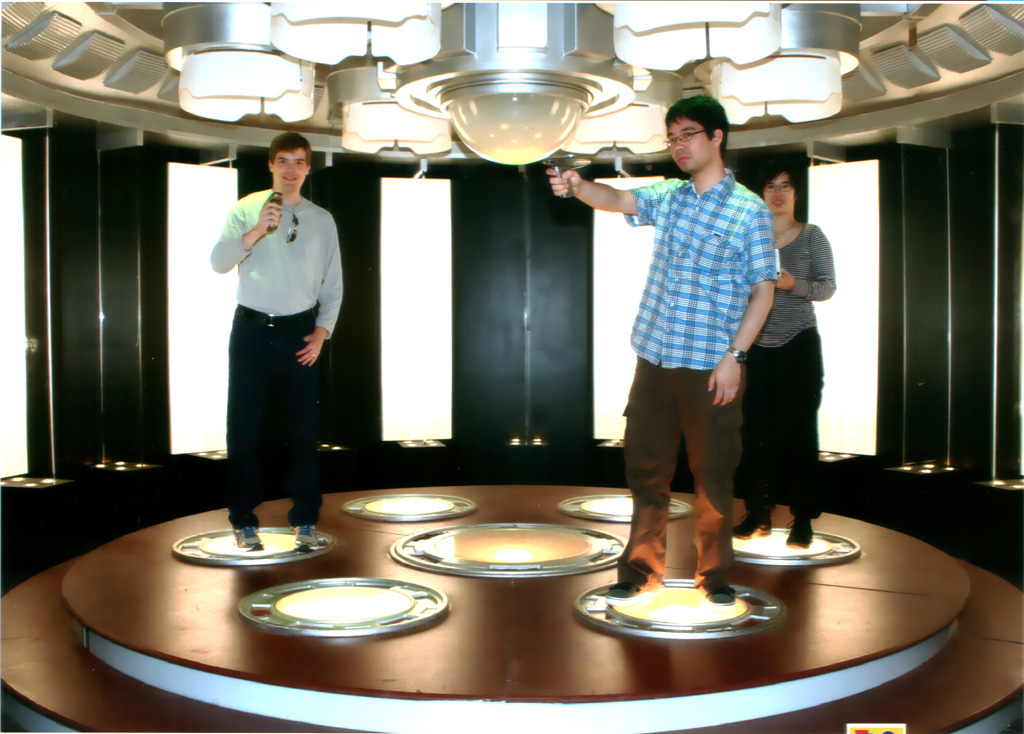
Views: 9060
How to make a great book cover for free
Post #: 130
Post type: Blog post
Date: 2012-08-30 11:56:38.000
Author: Jeremy Reimer
Tags: Science Fiction, Writing
We are all told: "Don’t judge a book by its cover". Unfortunately, this is just another of the many lies that people propagate. Books ARE judged by their covers, and this is one area where independent authors are at a disadvantage compared to traditional publishers. Sure, it would be great to contract out to a real artist or graphic designer to make a stunning cover (and certainly better in the long run than letting a publisher do so in exchange for taking more of your royalty forever) but what if you don’t have the money? What if you are just starting out?
Well, it turns out that if you are short on money, there are actually lots of great tools that will let you produce a stunning book cover for free.
<h4>Start with a pencil sketch</h4>
Pen and pencil are as near to free as can be, and even in today’s digital age they are still an effective way to quickly sketch out a number of ideas. For my second novel, Heart of the Maelstrom, I had an idea of two figures in spacesuits looking out at an image of the Milky Way galaxy rising over a rocky landscape on a distant planet. The idea is one thing, but sketching it out makes it clear how it will come together. You can make a whole bunch of these sketches really quickly and refine them until you get what you want.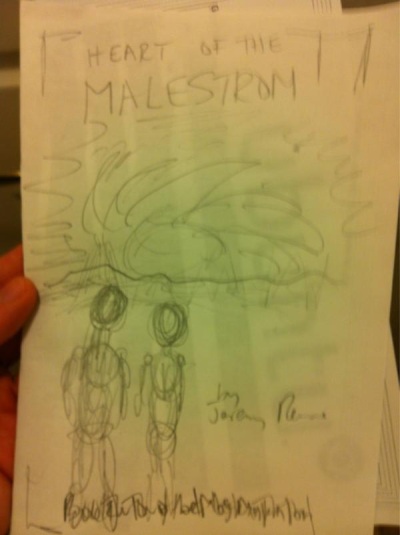
<h4>Need a landscape?</h4>
There is a great application called Flickr for some free background images that are licensed for commercial use.
<h4>Free 3D models</h4>
I needed an astronaut model in a spacesuit for my cover, but many sites offer only expensive paid models. NASA, however, had a page full of free models of all their satellites and space suits. I chose the Advanced Crew Escape Suite (ACES) which fit my story perfectly.
<h4>Free 3D rendering software</h4>
I have an old copy of 3D Studio Max from when I took an animation class, but there are free alternatives out there. One of the most popular is Blender, which has been used to make some stunning images and movies. Yes, Blender is a bit harder to learn than some commercial 3D packages, but remember, we are working from the assumption that we have little money to spare. If you have little money, you can use your own time instead.
<h4>Putting it all together</h4>
You need some 2D compositing software to put everything together and make it look good. One of the best free programs to do this is Paint.net, which does everything you need, including layers, lighting, filters, text, and so forth.
Many independent authors get the fonts wrong. The most common mistake is making either the title or the author’s name too large. There should be some whitespace around the title, and it is best to choose a font that isn’t too "thick" or fat. There are lots of free fonts out there. Choose something that is simple and not too fancy, but that isn’t Times New Roman or Arial. You don’t need to put your name in giant letters, either. Publishers selling books by famous authors sometimes do this for marketing purposes, but you aren’t there just yet. Keep your title larger than your name. If the text is hard to make out against the background, some judicious use of drop shadows can help.
For science-fiction titles, the Hubble photos are the best source for high-quality imagery, and they are free for the world to use. I took an image of a barred spiral galaxy as a stand-in for the Milky Way (which is also a barred spiral) and found a deep-field image to use as the
background.
In the end, hopefully you have a great-looking cover image that you made for free or close to free! This is the end result for my upcoming novel Heart of the Maelstrom, the second book in the Master’s trilogy. Good luck!
Views: 8682
Stop pretending blogs are made of paper
Post #: 129
Post type: Blog post
Date: 2012-08-17 20:03:38.000
Author: Jeremy Reimer
Tags: Blogs
Here's my pet peeve of the day: Blogs that say things like: "Find out the answer after the fold" or "More after the jump".
YOU ARE A WEB PAGE. THERE IS NO FOLD. THERE IS NO JUMP. If I want to continue reading, I will continue reading. Maybe I'll have to scroll down. If I care enough, I will. I've never once gone to a blog and thought to myself: "Well, this wasn't interesting enough to keep reading, but I have to find out what's after that jump!" What the hell is a jump, anyway?
Oh, you put a stupid ad to break up your content? Is that what you meant? Wow, I've almost lost interest in your page now. Oh look, there's the "Close" button on the tab. I wonder what happens if I press that?
Views: 16542
My article on computer/phone/tablet marketshare is up on Ars Technica!
Post #: 128
Post type: Blog post
Date: 2012-08-14 20:24:20.000
Author: Jeremy Reimer
Tags: Computers

It’s hard to believe the last time I did one of these articles was 2005, and since then not one but TWO new product categories have been introduced to the world.
I’m pretty happy with the way this article turned out, which is pretty much exactly how I wanted it: a nostalgia trip for the personal computer industry and a comparison with the new smartphone and tablet world.
Oh, here’s the link:
http://arstechnica.com/business/2012/08/from-altair-to-ipad-35-years-of-personal-computer-market-share/
Views: 16688
It was thirty years ago today...
Post #: 126
Post type: Blog post
Date: 2022-01-25 22:43:39.000
Author: Jeremy Reimer
Tags: Family, Audio
August 13, 1982. A young, precocious ten year-old boy finally convinces his family to let him tape record the evening meal.
Thirty years later, a much older boy finds the tape in a closet and decides to try and preserve long-lost family memories. (Digitizing and cleaning up the audio was an interesting process, and I’ll blog about that later).
I was a bit of a twit back in those days, a bit of a know-it-all, and I liked to interrupt people a lot. I think a lot of it was being ten, and the rest of it was due to my excitement at finally being able to record dinner. It was kind of a like a very early podcast!
Hearing my mom and dad’s voices again is very bittersweet, but I also laughed a lot. Check out the coffee grinder at 26 minutes in!
You can read more about the "Flying Bandit" that my dad referred to (and once met) here: http://thiswaswinnipeg.blogspot.ca/2008/07/flying-bandit.html
Link to Reimer Family Dinner 1982
Views: 16506
NASA Curiosity rover lands on Mars!
Post #: 124
Post type: Blog post
Date: 2012-08-05 22:52:16.000
Author: Jeremy Reimer
Tags: Space
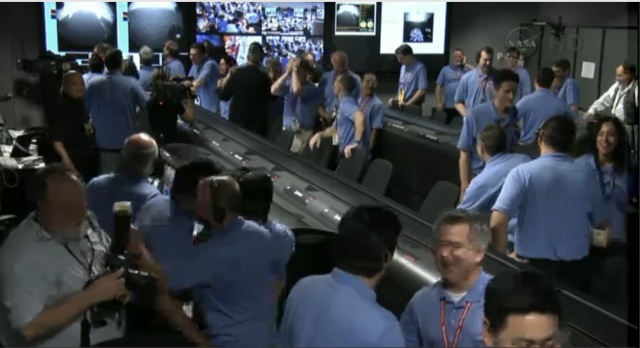
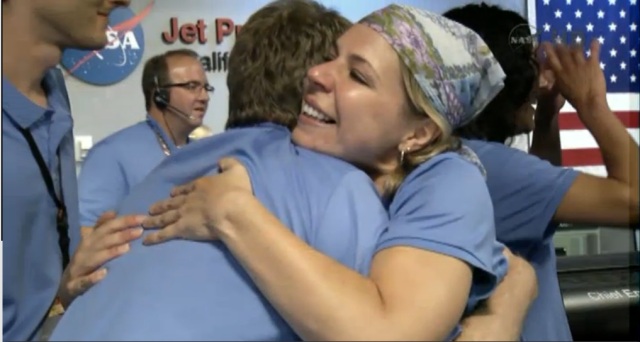
Views: 7888
Knotty Geeks Episode 17 - Where are the flying cars?
Post #: 123
Post type: Podcast
Date: 2012-07-21 08:44:49.000
Author: Jeremy Reimer
Tags: Knotty Geeks
In a special Knotty Geeks recorded deep inside the new Surrey campus of Simon Fraser University, we look at our accelerating world and ask if technology is really progressing in all areas or are we sliding backwards in some? From flying cars to asteroid mining, what does the future really hold?
Links from the show:
Ray Kurzweil on acceleration: http://www.amazon.com/The-Singularity-Is-Near-Transcend/dp/0670033847
Ronald Reagan declared GPS should be free to everyone: http://www.america.gov/st/washfile-english/2006/February/20060203125928lcnirellep0.5061609.html
Flame virus: http://arstechnica.com/security/2012/05/spy-malware-infecting-iranian-networks-is-engineering-marvel-to-behold/
Where are the flying cars? http://www.thebaffler.com/past/of_flying_cars
You are not so smart: http://www.amazon.com/You-Are-Not-So-Smart/dp/1592406599
This will make you smarter: http://www.amazon.com/This-Will-Make-You-Smarter/dp/0062109391
./uploads/Knotty_Geeks_Episode_17.mp3" />
./uploads/Knotty_Geeks_Episode_17.mp3" width="290" height="24" />
Views: 7582
Going to Comic-Con!
Post #: 122
Post type: Blog post
Date: 2012-07-11 21:28:20.000
Author: Jeremy Reimer
Tags: Conventions, Comics

Tomorrow I'm getting on a plane for San Diego, headed for Comic-Con!
I've never been to a Comic-Con before, so I have no idea what to expect. I've downloaded the schedule on a great iPhone app that I used for PAX called Guidebook.
I'm excited!!
Views: 8309
Barcraft Night in Vancouver
Post #: 121
Post type: Blog post
Date: 2012-06-13 15:34:03.000
Author: Jeremy Reimer
Tags: Gaming, Starcraft

The Barcraft was a huge success! We nerds took over both sides of the bar and every single TV screen was showing Starcraft II.
Plenty of drinks and fun were had while we cheered Park "DongRaeGu" Soo Ho as he won his first MLG Championship title on a live stage.
It was completely awesome and I will definitely be back for the next one!
Views: 8283
So who am I?
I'm a writer and programmer. I write science fiction stories and novels.
I am the writer for the upcoming documentary series Arcade Dreams.
I also write technology articles for Ars Technica.
I'm the creator of newLISP on Rockets, a web development framework and blog application.
- Email: jeremy.reimer@gmail.com
Topics
3D Modeling
About Me
Amiga
Articles
Audio
Blockchain
Blog
Blogs
Book Reviews
Book review
Comics
Computer history
Computers
Computers Microhistory
Computing
Conventions
Crypto
Daily update
Entrepreneur
Family
Forum post
Gaming
Gaming Starcraft
Gaming metaverse
Internet
Jeremy Birthday
Keats
Kickstarter
Knotty Geeks
Knotty Geeks (video)
Market Share
Masters Trilogy
Monarch
Movies
My Non-Fiction
My Science Fiction
NewLISP Blog
Novels
OSY
Operating Systems
Pets
Poll
Reviews
Science Fiction
Servers
Software
Software Operating Systems
Space
Star Gamer
Star Trek
Starcraft
Television
Testing
Toys Childhood
Valheim
Wedding Marriage
Work
Work Life
World
Writing
 RSS Feed for this blog
RSS Feed for this blog